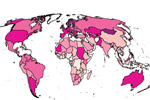If you want to lower your greenhouse gas emissions, choose chicken or poultry over beef and dairy, according to a massive new study in the Proceedings of the National Academy of Sciences (PNAS). The study finds that global cattle production—both for beef and dairy—is responsible for a whopping 77 percent of the world’s greenhouse gases attributed to livestock. Meanwhile, pork and poultry account for only 10 percent the greenhouse gases from livestock.
“Our goal is to provide the data needed so that the debate over the role of livestock in our diets and our environments and the search for solutions to the challenges they present can be informed by the vastly different ways people around the world raise animals,” said Mario Herrero, lead author of the study and formerly with the International Livestock Research Institute (ILRI). The study was conducted by the ILRI along with scientists at the Commonwealth Scientific and Industrial Research Organization (CSIRO)
Although the study found widely regional differences in the environmental impacts of various livestocks, it also confirmed that pigs and poultry (known as monogastrics because they have a single chamber in their stomach) are far more efficient at converting feed into protein cattle, sheep, and goats (or ruminants), and thus have less of an environmental impact.
One kilo of protein from cattle, sheep, or goats emits 58 to 1,000 kilos of carbon depending largely on the way it was raised, according to the research. However, a kilo of pork emits 24 kilos, or less than half the bottom figure for ruminants. But chicken remains the most sustainable, emitting only 3.7 kilos of carbon for one kilo of protein.
“There’s been a lot of research focused on the challenges livestock present at the global level, but if the problems are global, the solutions are almost all local and very situation-specific,” noted Herrero.
Generally meat-eating is less efficient and more environmentally harmful than a plant-based diet. But meat-eating is rising overall worldwide, largely to increasing wealth—and richer diets—in countries like China, Brazil, and India. But in some parts of the wealthy world, such as the US and northern Europe, meat-eating is actually downtrending slightly.

Cattle ranching in the Brazilian Amazonian. Cattle are the leading cause of deforestation in Brazil, adding to their already large greenhouse-gas footprint, not mention other environmental issues. Photo by: Rhett A. Butler.
Citations:
- Mario Herrero et al. (2013) Biomass use, production, feed efficiencies, and greenhouse gas emissions from global livestock systems. PNAS. DOI: 10.1073/pnas.1308149110.
Related articles
Humans are not apex predators, but meat-eating on the rise worldwide

(12/05/2013) A new paper in Proceedings of the National Academy of Sciences has measured the “trophic level” of human beings for the first time. Falling between 1 and 5.5, trophic levels refer to where species fit on the food chain. Apex predators like tigers and sharks are given a 5.5 on trophic scale since they survive almost entirely on consuming meat, while plants and phytoplankton, which make their own food, are at the bottom of the scale. Humans, according to the new paper, currently fall in the middle: 2.21. However, rising meat-eating in countries like China, India, and Brazil is pushing our trophic level higher with massive environmental impacts.
Foodies eat lab-grown burger that could change the world
(08/06/2013) Yesterday at a press event in London, two food writers took a bite into the world’s most unusual hamburger. Grown meticulously from cow stem cells, the hamburger patty represents the dream (or pipedream) of many animal rights activists and environmentalists. The burger was developed by Physiologist Mark Post of Maastricht University and funded by Google co-founder Sergey Brin in an effort to create real meat without the corresponding environmental toll.
Meat consumption jumps 20 percent in last decade with super-sized environmental impacts

(10/11/2011) Meat consumption and production remains on the rise, according to a new report Worldwatch Institute, with large-scale environmental impacts especially linked to the spread of factory farming. According to the report, global meat production has tripled since 1970, and jumped by 20 percent since 2000 with consumption rising significantly faster than global population.







